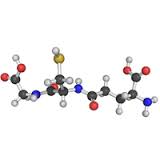 Every living cell in your body has this miracle molecule. As with oxygen, water and fuel (food), if this molecule is absent from a cell the cell will die. If it is not at an optimum level the cell will struggle to do its work. This molecule is made by your body and every cell in your body needs it.
Every living cell in your body has this miracle molecule. As with oxygen, water and fuel (food), if this molecule is absent from a cell the cell will die. If it is not at an optimum level the cell will struggle to do its work. This molecule is made by your body and every cell in your body needs it.
This miracle molecule is called glutathione. Glutathione is a tripeptide composed of three amino acids – glutamic acid, cysteine, and glycine. The cysteine amino acid contains a sulphur group which is responsible for many of the beneficial chemical properties of the whole glutathione protein.
The U.S. government website PubMed tracks scientific and medical studies globally. If you go to www.pubmed.gov and search for studies on Vitamin_C you will find about 55,000 articles; for Vitamin_E you will find about 38,000; but if you look for studies involving glutathione you will find about 124,000. And the rate at which research studies involving glutathione are added to that total far exceeds the corresponding rate for other antioxidants. This indicates a high level of glutathione-related research activity in the medical community worldwide.
The Glutathione molecule was discovered over 120 years ago. Referred to as a guardian molecule, glutathione is:
- the Master Anti-Oxidant in each cell (removes free radicals)
- the Master Anti-Inflammatory in each cell
- the Master Detoxifier in each cell
- necessary for the production of energy (ATP) by each cell
In terms of energy production, if the mitochondria detects insufficient glutathione, energy production will slow down to prevent the cell from killing itself by using up all the available glutathione.
Abundant glutathione:
- increases energy
- slows the ageing process (by protecting DNA from damage)
- aids muscle and joint recovery
- strengthens immune system
- aids cell detoxification
- fights cellular inflammation
- robustly supports liver function
- improves mental focus and clarity
- improves quality of sleep
- reduces the effects of stress
- supports peak athletic performance
- improves the health and look of skin
Glutathione is diminished by:
- ageing
- stress
- inflammation
- sun exposure
- athletic activity
- sleep deprivation
- environmental toxins
- acetaminophen (Tylenol)
These various things diminish glutathione. The cells produce glutathione. If the demand for glutathione exceeds the production levels, the cells in your body will function less and less efficiently, leading to a variety of undesirable effects (e.g., disease).
In terms of ageing, from about age 20 the level of glutathione will go down about one percent or so per year.
Extreme overdoses of Tylenol can kill you and it does so by consuming the glutathione from your liver as the liver tries to dispose of the acetaminophen. This is because the liver is the main detoxifier of the body and it uses glutathione in that process. If all of the glutathione in the liver is used to deal with the Tylenol overdose, the liver will die – and if the liver dies the body will die.
Low glutathione levels have been linked to over 70 diseases and conditions.
Cysteine is an amino acid. Production of glutathione is limited by the level of delivery of intact cysteine (cysteine that has an intact sulphur group) into the cell. This is because there typically is not sufficient cysteine in your diet.
There are a number of ways that can be used to impact glutathione levels:
- Glutathione taken orally: Glutathione when take orally is simply broken down by the digestive system and rarely survives to render any benefit. The sulphydryl group on the cysteine component is very delicate and it is this that is destroyed by digestion. Generally, taking glutathione capsules is a waste of money. It may increase glutathione levels by 3%.
- Glutathione taken intravenously: This does deliver glutathione into the system. It is short acting since it does not promote new generation of glutathione and is an expensive medical treatment. In addition, the glutathione molecule is too large to go through the cell wall. So it does not get inside the cell where it is needed to do its job.
- Large doses of whey protein taken orally: Whey protein does contain cysteine and some of that has the sulphydryl group. Some of this will get through the digestive process. This requires people to take a huge amount to realize benefit. If a person is prepared to do this they might see an increase of 15-20% in glutathione levels.
- l-cysteine taken orally: Cysteine by itself (exposed sulphydryl group) will typically not survive the trip through the digestive system. Effective treatment would require large doses.
There are a couple of nutritional supplements that deliver intact cysteine to the cells by protecting the delicate cysteine molecule through the digestive system and the bloodstream. These are probably the most effective ways to help the body increase its intracellular glutathione levels naturally.
Look again at the list of what happens when you have abundant levels of glutathione in the cells of your body.
- increases energy
- slows the ageing process (by protecting DNA from damage)
- aids muscle and joint recovery
- strengthens immune system
- aids cell detoxification
- fights cellular inflammation
- robustly supports liver function
- improves mental focus and clarity
- improves quality of sleep
- reduces the effects of stress
- supports peak athletic performance
- improves the health and look of skin
If all the cells of your body are healthy, you will be healthy. When you think about it, it’s no wonder that glutathione is referred to as the body’s miracle molecule.
#health #science #glutathione
Resources: goglutathione.com